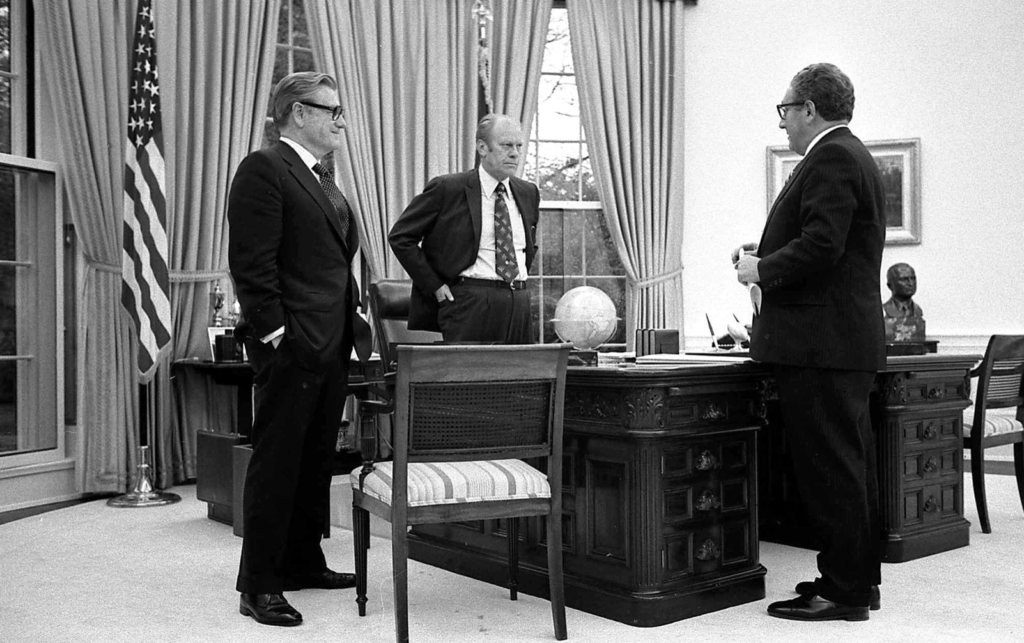
Henry Kissinger’s death impelled the usual slate of articles: some full of praise, others full of condemnation. Walter Benjamin once said, “There is no document of civilization which is not at the same time a document of barbarism.” For a writer to appropriately capture Kissinger’s life, he must embrace this dualism. These various condemnations and praises are not split by party lines. Rather, one’s opinion on Henry Kissinger is an acid test for one’s relation to political moderation. If you think Kissinger the devil—you are a radical, on the left or right. If you think Kissinger’s realism was a net good—you are moderate. If you consider Kissinger to have been an unmitigated good for the world—you, almost certainly, do not exist.
A popular criticism of Kissinger is his relationship with China. However, no one except Mr. Kissinger will ever be in the same situation as he was at the height of the Cold War. Criticize all you want, but the man possessed a political acumen far beyond that of many, most, maybe all of the secretaries of state in the past century. Imagine for a moment, Hillary Clinton, or, for the truly imaginative, Antony Blinken, in the same circumstances as Kissinger. Devoid of his complex understanding of both world history and foreign affairs, they would fail miserably.
Kissinger was lauded as variously an academic, writer, public intellectual, television commentator, national security advisor, consultant to multinational corporations, Secretary of State, and architect of Cold War nuclear policy. None yet, though, have remarked on what I liked most about Kissinger: his aphorisms. The aphorism, defined by Andrew Hui, is “a short statement requiring interpretation.” Kissinger produced many.
After Pinochet’s coup in Chile, Kissinger issued a consequential aphorism. “I don’t see why we need to stand by and watch a country go Communist due to the irresponsibility of its own people,” he said. The quote registers as not only apathetic but a little ignorant. Barry Gewen, in his marvelous work The Inevitability of Tragedy, would go on to show in his opening chapter the dilemmas at which this aphorism reached. While of course it rings as highly undemocratic, Gewen does a great job of contextualizing the tough decisions that Kissinger had to make in the most dangerous of Cold War moments.
There were moments when Kissinger sounded like another Woody Allen. “Nobody will ever win the battle of the sexes,” he once remarked, because “there is too much fraternizing with the enemy.” This he knew well.
One gets a sense from such quotes of what it was like to know him. He once said, “The nice thing about being a celebrity is that if you bore people they think it’s their fault.” Another time he remarked, “Great men are so rare they take some getting used to.” Those who speak of having met Kissinger often agree that he embodied such a statement.
Kissinger understood the art of politicking. “In Washington, the appearance of power is … almost as important as the reality of it. In fact, the appearance is frequently its essential reality.” All one needs to do is look at Dartmouth’s “first-year fellows” to understand that power seems all the more about aesthetics than about concrete visions for the future structure of the world.
Kissinger also provided a minute analysis of university life: “The reason that university politics is so vicious is because stakes are so small.” Many use this quote not realizing that it was one of their arch-nemeses who originally made the remark.
I have always loved Kissinger the aphorist. In trying to choose a yearbook quote I thought much about trying something from the great songwriter and poet Leonard Cohen. But this would have been to put on too much of the pseudo-intellectual affect that I despise. Henry Kissinger came to my rescue in the form of his brilliant remark that “[p]ower is the ultimate aphrodisiac.” I learned later that Neil Gorsuch too had chosen a Kissinger line for his yearbook: “The illegal we do immediately; the unconstitutional takes a little longer.”
Kissinger has informed my own view of intellectual development. “The convictions that leaders have formed before reaching high office are the intellectual capital they will consume as long as they continue in office. There is little time for leaders to reflect. They are locked in an endless battle in which the urgent constantly gains on the important.” This applies even if one is not interested in politics. College is the moment for intensive education. When one reaches the upper echelons of the world, be they banking, military, diplomacy, or anything else, one must have a store of knowledge to draw upon.
Kissinger also had his reflections on history and its uses. While he obtained his degree in government from Harvard, his real education was grounded in the rigorous study of diplomatic history. He once wrote, “History teaches by analogy, not identity. This means that the lessons of history are never automatic.” Let this be a caution to our current leaders, and also a warning. Think of some good quotes! I am tired of witless politicians.
Finally, and most importantly, Kissinger was an immigrant and lent an outsider’s view. He was able to succeed enormously but never lost his strong Germanic accent. This heritage gave him a unique vantage point from which to view American failures. He did not shy away from voicing them: “The American trait I dislike the most is their casual approach to life. No one thinks ahead further than the next minute. No one has the courage to look life squarely in the eye.” Let us do better.

Be the first to comment on "Henry Kissinger: The Aphorist"